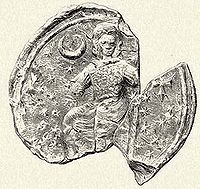Leo II of Galicia
| Leo II of Galicia | |
|---|---|
 King's seal of Leo II of Galicia | |
| King of Rus' | |
| Reign | 1308–1323 |
| Predecessor | Yuri I of Galicia |
| Successor | Yuri II Boleslav |
| Co-monarch | Andrew of Galicia |
| Born | Unknown |
| Died | c. 1323 Berestia |
| House | Romanovichi |
| Father | Yuri I of Galicia |
| Mother | Euphemia of Kuyavia |
Leo II of Galicia, also known as Lev Yurevich (unknown – 1323) was Prince of Lutsk and Galicia, one of the last two Romanovichi kings of Rus` (r. 1308–1323; according to some sources, 1315–23[citation needed]). He was a member of the senior branch of Monomakhovichi.
He was the son of King Yuri I (1252–1308), whom he succeeded on the royal throne of Galicia-Volhynia. After the death of his father, he ruled the kingdom together with his brother Andrew. His mother was Euphemia of Kuyavia. According to most sources, the brothers were co-kings, managing the kingdom together, but there are sources indicating that Lev II was seated in Halych and Andrew in Volodymyr (and yet others stating a similar arrangement, but with the seats reversed)[citation needed], which would seem to imply split jurisdiction.
Fighting Lithuania and Tatars[edit]
The first common letter of Lev II and Andrew dates to August 9, 1316[citation needed], in which they renewed the union with the Prussian Crusaders (the Teutonic Order, also known as the Teutonic Knights), whom they promised to defend from the Tatars and "any hostile invader"; the latter mention apparently referred to the Grand Duchy of Lithuania, as that state at the time threatened not only the unity but also the very existence of both the Knights and the Galician state.
It is reported that in the second decade of 14th century, the Lithuanians increased their pressure upon Galicia-Volhynia, eventually wresting away control of Dorohychyn and Berestia. The years of the brothers' "joint" reign were in spent in more-or-less constant conflict with both the Gediminids of Lithuania and with their own nominal overlords, the Mongol-Tatars of the Golden Horde.
Lev II and Andrew established firm relations with the Polish High Duke (King) Władysław I (Władysław the Short or Elbow-high; also known as Ladislaus I of Poland, Polish: Władysław I Łokietek) and, as already pointed out above, with the crusading knights of the Teutonic Order, as well as striving to lessen the ties of their kingdom's subservience to the Golden Horde.
They were also in union with the allies of King Władysław I – the Scandinavian Kings and the Pomorian Dukes – against the Margraves of Brandenburg (1315).[citation needed]
Death[edit]
Sources differ on the circumstances of his death; most historians agree he died, together with his brother Andrew, in 1323, but there is disagreement over whether they were battling the Mongol-Tatars or the Lithuanians, and over whether the deaths occurred while defending Pidliashia or Berestia.[citation needed]
Both King Lev and his brother King Andrew were apparently much respected in the west. In May 1323, Polish King Władysław I, in a letter to the Pope, wrote with obvious regret: "Two last Ruthenian (Ukrainian) kings, that had been firm shields for Poland from Tatars, left this world and after their death Poland is directly under Tatar threat.[citation needed]
In 1321, Lev's son, Prince George of Lutsk, the last of the line, had died in a battle with the forces of Grand Duke Gediminas of Lithuania while defending the castle in Lutsk. After the deaths of Lev II and his brother two years later, the line of the direct descendants of Roman Mstislavich ended, and the Galician state was left without a ruling dynasty. The Galician boyars (nobility) subsequently attempted to rule the state themselves. Fearing subjugation by Władysław I, they apparently sought the protection of the Tatars. But soon more conservative elements amongst the boyars gained the upper hand, and the Galician throne was given to the Mazovian Duke Boleslaw Trojdenowicz (who was related to the deceased royal brothers through the marriage of his father Trojden I of Masovia to their sister Maria).
Ancestry[edit]
| Ancestors of Leo II of Galicia | |||||||||||||||||||||||||||||||||||||||||||||||||||||||||||||||||||||||||||||||||||||||||||||||||||||||||||||||||||||||||||||||||||||||||||||||||||||||||||||||||||||||||||||||||||||||||||||||||||||||||||||||||||||||||||||||||||||||||||||||||||||||||||||||||||||||||||||||||||||||||
|---|---|---|---|---|---|---|---|---|---|---|---|---|---|---|---|---|---|---|---|---|---|---|---|---|---|---|---|---|---|---|---|---|---|---|---|---|---|---|---|---|---|---|---|---|---|---|---|---|---|---|---|---|---|---|---|---|---|---|---|---|---|---|---|---|---|---|---|---|---|---|---|---|---|---|---|---|---|---|---|---|---|---|---|---|---|---|---|---|---|---|---|---|---|---|---|---|---|---|---|---|---|---|---|---|---|---|---|---|---|---|---|---|---|---|---|---|---|---|---|---|---|---|---|---|---|---|---|---|---|---|---|---|---|---|---|---|---|---|---|---|---|---|---|---|---|---|---|---|---|---|---|---|---|---|---|---|---|---|---|---|---|---|---|---|---|---|---|---|---|---|---|---|---|---|---|---|---|---|---|---|---|---|---|---|---|---|---|---|---|---|---|---|---|---|---|---|---|---|---|---|---|---|---|---|---|---|---|---|---|---|---|---|---|---|---|---|---|---|---|---|---|---|---|---|---|---|---|---|---|---|---|---|---|---|---|---|---|---|---|---|---|---|---|---|---|---|---|---|---|---|---|---|---|---|---|---|---|---|---|---|---|---|---|---|---|---|---|---|---|---|---|---|---|---|---|---|---|---|---|---|---|
| |||||||||||||||||||||||||||||||||||||||||||||||||||||||||||||||||||||||||||||||||||||||||||||||||||||||||||||||||||||||||||||||||||||||||||||||||||||||||||||||||||||||||||||||||||||||||||||||||||||||||||||||||||||||||||||||||||||||||||||||||||||||||||||||||||||||||||||||||||||||||
See also[edit]
External links[edit]
- Great history of Ukraine: Galician-Volhynian state (in Ukrainian)
